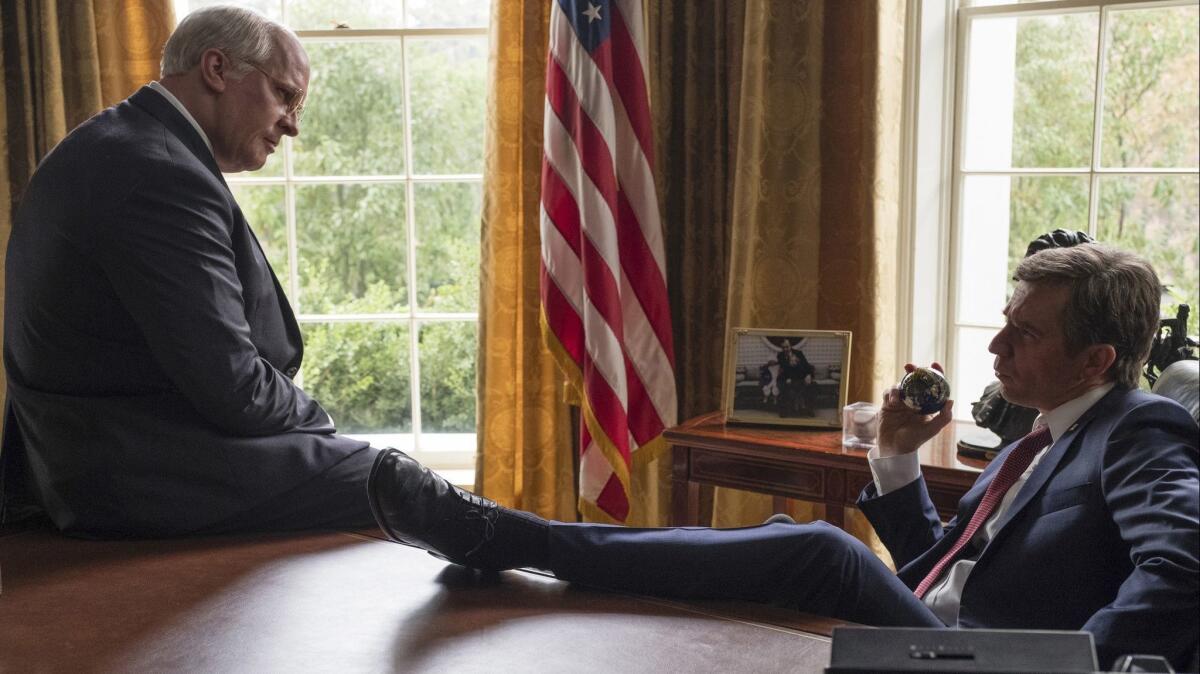Op-Ed: Why ‘Vice’ deserves an Oscar

- Share via
The movie “Vice” has been praised for telling the story of the rise of Dick Cheney, a tale punctuated by an array of effective performances — most notably by Christian Bale as Cheney. The fictionalized story has its critics as well; they accuse it of misrepresentnig important facts. But in one area in particular its honesty struck me like a thunderbolt: “Vice” illuminates a significant but little-known interpretation of the Constitution, called the unitary theory of executive power.
In the film, Cheney is introduced to the theory in the 1970s by a brilliant young conservative lawyer, Antonin Scalia. Here at last was a way of looking at the Constitution that would allow a conservative president, perhaps the ambitious Cheney one day, to freely exercise the kind of muscular power that could short circuit the pesky constraints on appropriations and war powers that had confronted Presidents Nixon and Ford. The theory took flight during the Reagan era, when lawyers in that administration’s Justice Department and members of the recently founded conservative organization the Federalist Society fleshed out what they argued was an “originalist” pedigree for the idea: The Founders, they argued, created a strong president whose powers had been wrongly eroded through the late 20th century.
The unitary theory includes two core tenets. The first is that, as then-federal judge and future Supreme Court Justice Samuel A. Alito Jr. said in 2000, “The president has not just some executive powers, but the executive power — the whole thing.” To those under the spell of the unitary theory, this means that the president’s authority over the executive branch is both complete and pretty much unlimited.
The relative obscurity of the unitary theory, combined with its profound and perverse power claims, has come back into focus during the Trump presidency.
The second key feature is that the other branches of government may not intrude on the president’s control of the executive branch. That is, Congress may not legislate, and the courts may not adjudicate matters that the president believes infringe on full and complete control of the executive. If they do, presidents may simply disregard those laws or decisions.
Most constitutional historians consider this interpretation of the Constitution far from the “original intent” of the Founders. After all, it rejects a fundamental tenet of American governance: checks and balances. As the political scientist Richard Neustadt noted long ago, our system is best understood as one of “separated institutions sharing powers.” Yes, the branches are distinct, but the powers are really blended, and it is that blending that allows checks and balances to function.
For Scalia, Cheney and others, it was too limiting. “Vice” portrays their alternate theory in action. Under Vice President Cheney’s tutelage, President George W. Bush (brilliantly portrayed by Sam Rockwell) argues that he can simply ignore laws or parts of laws that infringe on unitary executive power. There are hundreds of instances when, mostly through signing statements, Bush said that he was not bound by the otherwise authoritative terms of bills he was signing into law. He repeatedly objected, for example, to requirements that executive branch agencies supply information to Congress, despite Congress’ oversight power.
Enter the Fray: First takes on the news of the minute »
Most infamously, however, the unitary theory was put to work by John Yoo, a lawyer in the Department of Justice under Bush, when he penned a memo asserting that the president had the inherent power to order the use of torture against enemy combatants, plainly contradicting American and international law. As the film suggests, Cheney, along with a more shadowy figure, David Addington, played a pivotal role in prodding Bush to assert this found authority.
The relative obscurity of the unitary theory, combined with its profound and perverse power claims, has come back into focus during the Trump presidency. For example, just as Bush administration lawyers argued unsuccessfully in court in challenges to some of its key actions, Trump lawyers have argued on behalf of Trump’s immigration policies, claiming that the courts had no right to decide such matters because they are solely within the president’s unitary powers. It turns out that judges of all ideological stripes disagree, so such claims have generally been rejected to date. But with the recent appointment of Federalist Society-vetted judges to the federal courts and the Supreme Court, it is likely such claims will find greater favor in the future.
Whatever its merits as film art, “Vice” deserves a special public service Oscar for Best Depiction of a Wayward Constitutional Theory in Film award. Whatever its flaws, the movie shines a light on the most tendentious yet consequential constitutional theory of our time. In the hands of our current president, this theory is a loaded weapon pointed at the very essence of our three-branch governing system.
Robert J. Spitzer is chairman of the political science department at the State University of New York in Cortland, and the author of several books on the presidency. He has also written on the unitary theory of power.
Follow the Opinion section on Twitter @latimesopinionand Facebook
More to Read
A cure for the common opinion
Get thought-provoking perspectives with our weekly newsletter.
You may occasionally receive promotional content from the Los Angeles Times.






